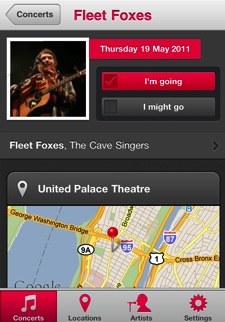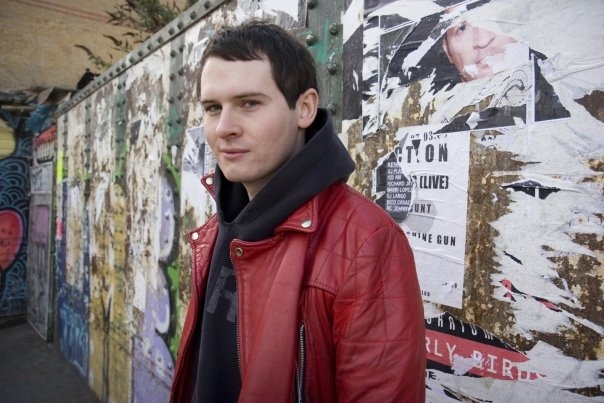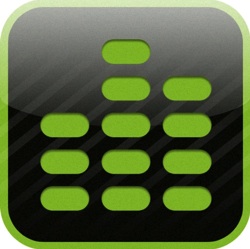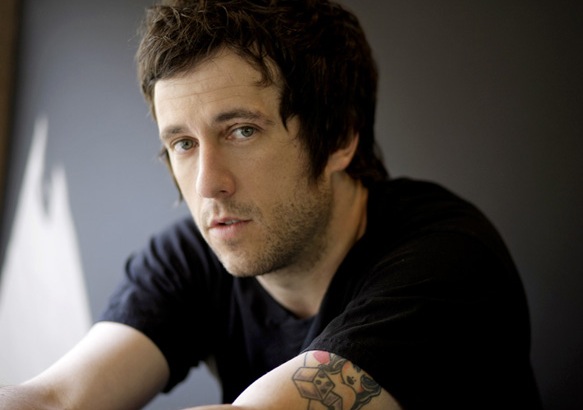Videos by American Songwriter
Songkick is one of a handful of new companies that has taken a simple idea and is slowly transforming the music industry. The site puts concert listings in one single place by aggregating data from 150 ticket sites, then personalizes it for users by scanning artists from their iTunes or Pandora account. Since Songkick launched an iPhone app, which further integrates the listings with location-based technologies, they’ve seen 100,000 activations in just two weeks. Ian Hogarth, one of the London-based company’s three founders, is thoughtful, precise, and well-spoken. We talked to him about the future of ticketing, how artists can use Songkick, and how it’s changing the behavior of music fans.
What’s the history of Songkick?
We started the company based on a very simple observation, which is when people are planning what to do on a Friday night – go to the movies, go to a concert, stay home with a DVD, grab a meal – all the options, apart from the concert, there are web services that make it easy to do that. For concerts, the experience of a fan is you have to go and browse multiple venue websites and these giant impersonal emails from Ticketmaster. Our idea is that it should be as easy as going to the movies.
Was it difficult to aggregate all the concert data from various ticketing sites?

It is quite technically challenging to do that, which is partly why no one had done it before. The technology is very similar to the technology Google has. We basically have a search engine that crawls all these different ticket sites on a daily basis. It was definitely challenging to implement, but we just hired very strong computer scientists with backgrounds in search technology to help us.
Can you talk about what you see happening in the ticketing space and how Songkick fits into that?
I think the biggest trends in ticketing are increased amounts of transparency and an increased number of options in the market. If you look at just the last year, you’ve had services like Eventbrite and Ticketfly emerge. You’ve got a fragmenting market and one where the consumer has increased choice. But I think probably the more interesting trend that is occurring is that artists are starting to directly sell tickets to their fans. Companies like Topspin and Crowdsurge have emerged to help artists do that. How Songkick fits into those trends is that we’re a neutral, independent aggregator of all of those tickets, and we make it easy for fans to go to one single place and see what’s available.
What is Songkick’s revenue model?
The way it works is when someone finds a ticket through our alerts and information, we get paid a percentage of the ticket value from the ticket vendor. The fans do not pay any more than they would if they went to the ticket site. Songkick gets paid effectively a marketing fee for having helped to market that concert.
Was it hard to get the ticketing sites on board for Songkick’s model?
People are always suspicious of a new product, especially in established industries. But as soon as you start sending traffic their way and driving ticket sales, and showing incremental sales, then everyone gets a lot more positive. What we found when we survey our users is that they go to 75% more concerts the year after they start using Songkick. We’re changing the behavior of music fans when they use Songkick and go to more concerts and buy more tickets. It’s really beneficial to everyone in the industry – the artists, the promoter, the venue, the ticket vendor.
What’s your personal take on the cloud music services and how do they affect Songkick?
We really love those services and we’re really active users of them. In Europe, you have Spotify, and in the States you have Rdio, Rhapsody, MOG, and Pandora. There’s a lot of great products out there for consuming music. All those music streaming services are moving into the cloud, and we see two things we’re going to do as part of that transformation. First, it’s going to be easier to get access to someone’s music taste and it’s going to be faster to personalize their concert listings. The second thing is we’re going to be able to integrate Songkick into these music player experiences. One partnership we’ve done that I’m really proud of is on YouTube, if you’re watching any video for a band that’s playing near you, it’ll show a link to that concert at the bottom of the video through Songkick. It helps you discover the show at the same time that it helps you discover the video.
The band Givers is playing at Schuba’s in Chicago on Friday, June 24:
Do you think in the future an artist or venue will be able to “claim” and control their own profile on Songkick?
We’ve considered it, but [right now] we’re trying to lay the focus on making the consumer experience as good as possible and trying to avoid complicating things by introducing that type of functionality at this point. As a small company, you have to figure out what your core focus is and do a great job at that. For us, we’re really just trying to make it incredibly easy for music fans to find shows to go to.
How can an emerging or unsigned artist utilize Songkick?
The first thing they can do is check to make sure their shows are listed on Songkick and if they’re not there, they can add them. That will mean that anyone who is tracking that band on Songkick will get alerted about their shows as soon as they are announced. The second thing they can do is point their fans towards Songkick and say track us on Songkick. That’s a very efficient way of making sure your fans get notified of your shows in a very personalized, automated manner. Finally, if you use any artist services to manage your web presence, you can use Songkick to help coordinate that. A simple example is if you have a Bandcamp profile, you can automatically manage the tour dates via Songkick.
Has their been any reaction to Songkick by other listings publications, such as alt weeklies?
The thing that’s really great about the weeklies, is that because they are locally focused, they have a very comprehensive view of what’s happening in the market. And that’s one of the things we aim to replicate. We want to make sure we have every single concert large and small and every single ticket as well. There are a few ways in which we differ. When you’re reading a paper, you can’t just click and buy a ticket. Another difference is that we’re a global service. You can have Songkick in your pocket and go from New York to L.A. and it works seamlessly. Finally, the biggest difference, we’re not putting the onus on the music fans to browse listings and scan through everything happening over a given week. We’re saying to you: Here are the concerts you like. Here’s a personalized view of all these events happening so you don’t have to do as much work.
Do you see Songkick moving beyond the music vertical?
You never really know what the future holds. But the way we look at is that live music is an incredibly important cultural pillar and $40 billion is spent every year on live music around the world, so it’s a very significant industry as well. Doing justice to that and doing a great job for all the people going to see live music is a big enough job in itself.















Leave a Reply
Only members can comment. Become a member. Already a member? Log in.